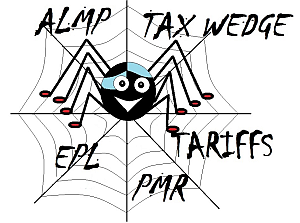Productivity and long term growth
Structural Policy Indicators Database for Economic Research (SPIDER)
 The OECD’s Structural Policy Indicators Database for Economic Research (SPIDER) provides a broad range of data to researchers in ready-to-use formats to facilitate empirical/econometric research investigating the nature and the impact of structural policies.
The OECD’s Structural Policy Indicators Database for Economic Research (SPIDER) provides a broad range of data to researchers in ready-to-use formats to facilitate empirical/econometric research investigating the nature and the impact of structural policies.
It includes about 500 policy and institutional indicators from almost 50 different OECD and non-OECD data sources. The policy variables stored in the database are annual or less frequently available (every five years or only once). The database will be updated on a yearly basis.
The database covers the following broad categories of policy variables: i.) legal infrastructure and institutions describe features of the political system, the underlying legal institutions and indicators measuring the quality and various aspects of public governance; ii.) framework condition policies include policies that condition the environment in which firms operate and make decisions such the product market regulation (PMR/ETCR) indicators, the competition law and policy (CLP) indicator and a number of labour market institutions; iii.) specific policies cover policies relating for instance exclusively to specific segments of the labour market (older workers, women or the youth) and include family benefits, policies influencing decisions to retire. Examples of other specific policies are measures primarily designed to support R&D investment or exports.
The database is available as a TEXT FILE (40 MB), data formats for EVIEWS (131MB) (.wf1), and STATA (123MB) (.dta).
See also the detailed data sources and definitions.
The database is described in more detail in Égert, Gal and Wanner (2017), “Structural policy indicators database for economic research (SPIDER)”, OECD Economics Department Working Paper No. 1429.
When using this data, please cite this working paper as your source.
Related Documents